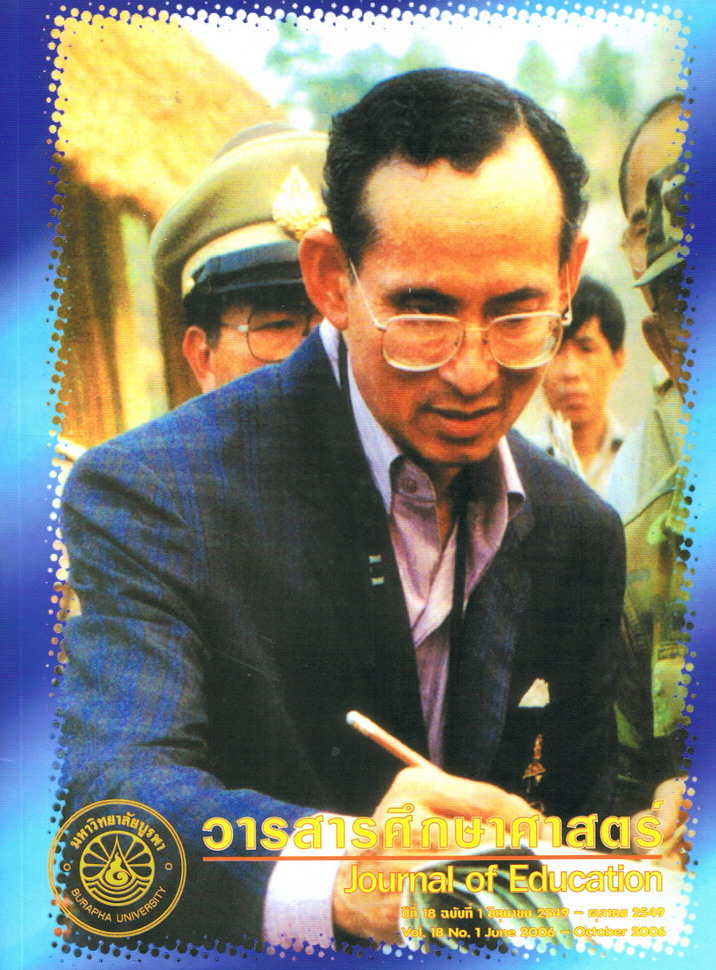ผลการให้คำปรึกษาทฤษฎีโปรแกรมภาษาประสาทสัมผัส ต่อความสอดคล้องในการมองโลกของผู้ที่พยายามฆ่าตัวตาย The Effects of Neuro-Linguistic Programming on Sense Coherence of Attempted Suicidal Clients
บทคัดย่อ
การวิจัยครั้งนี้มีจุดมุ่งหมายเพื่อศึกษาผลการให้คำปรึกษาทฤษฎีโปรแกรม ภาษาประสาทสัมผัสต่อความสอดคล้องในการมองโลกของผู้ที่พยายามฆ่าตัวตาย กลุ่มตัวอย่างได้แก่ผู้ที่พยายามฆ่าตัวตายที่เข้ารับการรักษาในโรงพยาบาลแห่งหนึ่งในจังหวัดสมุทรปราการจำนวน 12 คน ที่มีคะแนน ความสอดคล้องในการมองโลกต่ำกว่า 87 และสมัครใจเข้าร่วมการวิจัย จากนั้น จึงสุ่มอย่างมีระบบ แบ่งเป็น2กลุ่ม คือกลุ่มทดลองและกลุ่มควบคุม กลุ่มละ 6 คน กลุ่มทดลองได้รับการให้คำปรึกษาโดยใช้ทฤษฏีโปรแกรมภาษาประสาทสัมผัส 3 เทคนิค เทคนิคการสร้างทรรศนะใหม่ ใต้จิตสำนึกแบบองค์รวม เทคนิครัศมีพลังแห่งตน และ เทคนิคการวางแผนอนาคต การเก็บรวบรวมข้อมูลใช้แบบสอบถามความสอดคล้องในการมองโลกของแอนโทนอฟสกี้ การเก็บข้อมูล แบ่งเป็น 3 ระยะคือระยะก่อนการทดลอง ระยะหลังการทดลองและระยะติดตามผล จากนั้นนำข้อมูลมาวิเคราะห์ด้วยวิธีการวิเคราะห์ความแปรปรวนแบบวัดซ้ำประเภทหนึ่งตัวแปรระหว่างกลุ่มและหนึ่งตัวแปรภายในกลุ่มและวิธีทดสอบรายคู่แบบนิวแมน-คูลส์ ผลการวิจัยพบว่า มีปฏิสัมพันธ์ระหว่างวิธีการทดลองกับระยะเวลาการทดลองอย่างมีนัยสำคัญ ทางสถิติที่ระดับ.05 ผู้ที่พยายามฆ่าตัวตาย กลุ่มทดลองมีคะแนนความสอดคล้องในการมองโลกสูงกว่ากลุ่มควบคุม ในระยะหลังการทดลองและระยะติดตามผล อย่างมีนัยสำคัญทางสถิติที่ระดับ .05 และ ผู้ที่พยายามฆ่าตัวตายกลุ่มทดลองมีคะแนนความสอดคล้องในการมองโลก ในระยะหลังการทดลองและระยะติดตามผล สูงกว่าระยะก่อนการทดลอง อย่างมีนัยสำคัญทางสถิติที่ระดับ .05 แต่ในระยะหลังการทดลองและระยะติดตามผลไม่แตกต่างกัน
The purpose of this research was to study the effects of Neuro-linquistic programming on sense of coherence of attempted suicidal clients. The sample consisted of twelve attempted suicidal clients at a hospital in Samutprakarn, who had the sense of coherence score lower than 87.These clients volunteered to join the research. The samples were divided into two groups by systematic random sampling and were assigned into the experimental group and the control group, with six members each . The experimental group was given three neuro linquistic programming techniques: the Global Unconscious Reflaming; the Personal Power Radiator, and the Future Planner. A questionnaire on Sense of Coherence by Antonovsky was used for collecting the data. The data collection procedure was divided into three phases; the pre- test, the post-test and the followup. The data were analyzed by repeated-measures analysis of varience— one between-subjects and one within-subject and Newman-Keuls procedure. The results revealed that the interaction between the methods and the duration of the experiment was found the statistically significant at .05 level. The participants in the experimental group demonstrated significantly higher than the control group at .05 level on sense of coherence in both the post-test and the follow-up. The experimental group had higher sense of coherence in the posttest and follow-up than the pre-test. No significant difference was found on sense of coherence during the post-test phase and the follow-up phase of the experimental group
ดาวน์โหลด
เผยแพร่แล้ว
รูปแบบการอ้างอิง
ฉบับ
ประเภทบทความ
สัญญาอนุญาต
ลิขสิทธิ์ของบทความที่ปรากฏในวารสารศึกษาศาสตร์ มหาวิทยาลัยบูรพา เป็นของวารสารศึกษาศาสตร์ มหาวิทยาลัยบูรพา ทั้งนี้บทความทุกเรื่องผ่านการตรวจสอบความถูกต้องทางวิชาการจากผู้ทรงคุณวุฒิ ข้อความและข้อมูลของบทความในวารสารฯ เป็นแนวคิดของผู้แต่ง มิใช่เป็นความคิดเห็นของกองบรรณาธิการ และมิใช่ความรับผิดชอบของคณะศึกษาศาสตร์ มหาวิทยาลัยบูรพา ไม่สงวนลิขสิทธิ์การนำไปใช้ประโยชน์ทางวิชาการแต่ต้องอ้างอิงแสดงแหล่งที่มาและอยู่ในขอบเขตของกฎหมายลิขสิทธิ์



